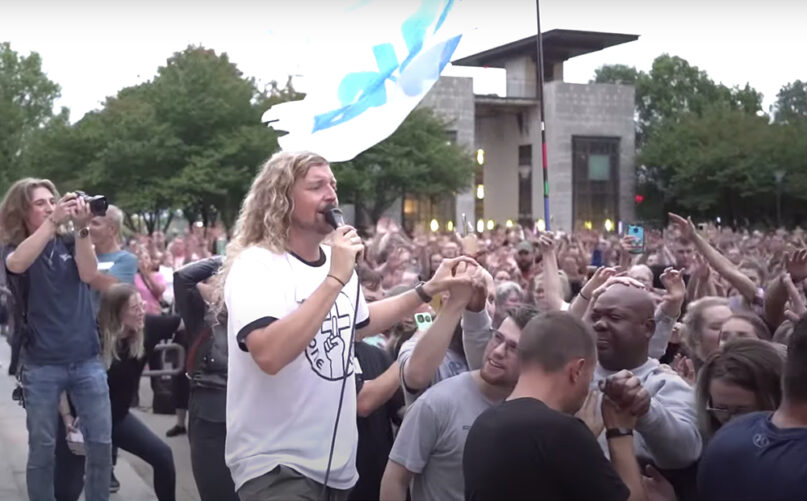(RNS) — Worship leading isn’t something that often makes the news. The biggest controversy surrounding our work is often whether or not we’re playing a congregation member’s favorite songs.
But Sean Feucht has been making headlines since mid-summer for his public worship events.
He calls it the #letusworship movement, or “riots to revivals,” and he has been leading ad-hoc worship music concerts in cities across the U.S. — most recently on the steps of the courthouse in Nashville, Tennessee (without a permit).
Feucht, who lost a bid for California’s 3rd Congressional District back in March, has reportedly billed the events as a Christian response to a “spirit of fear” and the perceived targeting and silencing of churches through COVID-19-related government ordinances. His efforts have been met with strong praise by some (including Bethel Church in Redding, California, with which he has been affiliated) and deep ire by others.
Why has a Pentecostal-Charismatic worship leader thrown his energies into this political fray?
On the one hand, public worship music gatherings (“concerts,” as some prefer) have become somewhat commonplace at least since Graham Kendrick’s Praise March movement in the late 1980s and early 1990s (“Shine Jesus Shine” was its soundtrack). We’ve grown accustomed to worship leaders wielding an increasingly influential level of celebrity within Christian media networks through megachurch platforms and mega-conferences like Passion.
On the other hand, there is something new and distinct happening here. Why is it that Feucht has chosen worship music in particular as the tool with which he rages against what he perceives to be the politically motivated repression of Christian worship in America?
I’m suggesting here that Feucht makes much more sense when you understand his theology of worship, even if you disagree with how he is wielding it. To disregard or fail to acknowledge his theology of worship is to risk misunderstanding what he and his attendees are attempting to accomplish.
Understanding Feucht’s worship theology
To understand why Feucht views worship music as the appropriate response to perceived religious oppression requires that we (all too briefly) unpack a theology of worship that enjoys widespread popularity today.
I’ll simply call it “praise and worship theology” even though it is not monolithic. It emerged out of the Latter Rain Revival movement of the late 1940s and came of age in the late 1970s and 1980s. Many of the large churches and church-based worship music groups have been directly influenced by it: Bethel, Gateway, Hillsong, IHOP and others.
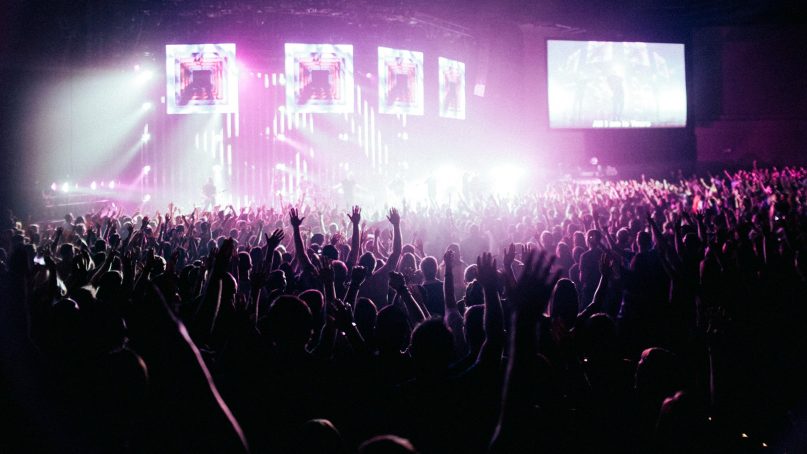
The congregation of James River Church in Joplin, Missouri, participates in a praise hymn. Photo by Joshua Sorenson/Unsplash/Creative Commons
The core of this theology is that praise and worship manifests God’s presence. Liturgical historian Lester Ruth has traced this theology back to a Pentecostal preacher named Reg Layzell in 1946 who popularized the idea that “God inhabits praise,” based on Psalm 22:3, which, in the KJV translation, reads: “But thou art holy, O thou that inhabitest the praises of Israel.”
By the late 1970s, a rich and diverse biblical theology had developed around this and other teachings as they related to a present-day restoration of musical worship modeled after the liturgical patterns instituted in the tabernacle of King David (1 Chronicles 15).
A second, intimately related shift also happened: the theological and functional conflation of the terms “praise” and “worship” with “music.” When Feucht says worship, he doesn’t mean a gathering where Christians pray, read the Bible and hear a sermon. He means a musical event where Christians sing praises to God.
These gatherings are important, then, because praise and worship, as they interpret Psalm 22:3 to mean, are the normal way Christians encounter God’s presence. Depending on your own worship background, this may sound radically new or utterly commonplace.
Worshipping at the seat of power
But what does that theology have to do with Feucht’s nationwide worship music events?
Consider this summary of a teaching by Barry Griffing, a Pentecostal-Charismatic pastor and conference leader. At a large worship conference in 1982, Griffing taught that when ancient Israel restored the practice of praise and worship as modeled in David’s tabernacle, the nation experienced “spiritual, moral and military blessing.” Furthermore, ancient Israel is a type for America and for the Christian church in America. If we, too, restore praise and worship, we can receive those same national blessings today.
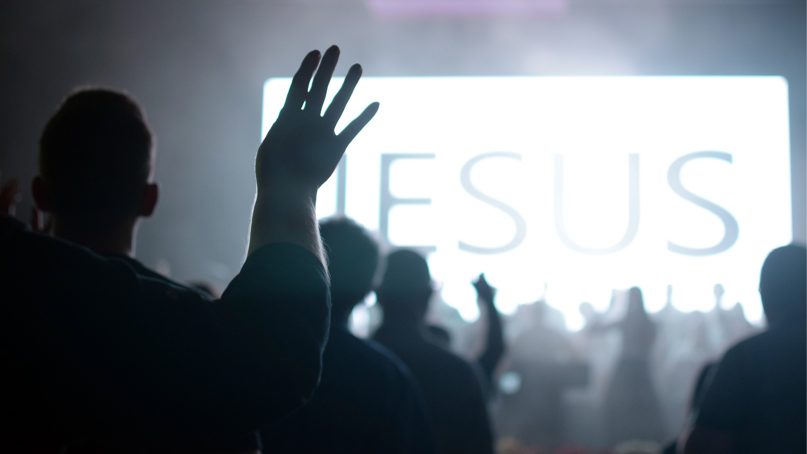
People raise their hands in praise while singing in church. Photo by Carolina Jacomin/Unsplash/Creative Commons
This theology hinges on the prophecy quoted in Acts 15:16 (quoting Amos 9:11), that God is restoring David’s tabernacle. At one point during his run for Congress, the verse adorned a political ad that featured Feucht standing atop a pile of rubble (the image has since been deleted).
Feucht is also embedded in the 24/7 prayer tent movement that draws its mission from this theology of tabernacle restoration (see David’s Tent DC, for example). Not coincidentally, Feucht’s #letusworship campaign itinerary also culminates in Washington, D.C., Sunday (Oct. 25).
This isn’t just a show of political power like any other demonstration in Washington, D.C., it also has spiritual — even “end-times” — significance for those gathered, as they believe praise and worship releases God’s power in the spiritual and physical realms. It’s why Feucht, in good Pentecostal fashion, reports healings and conversions as signs of God’s presence at his events.
Worshipping at the site of conflict
While Feucht insists his worship gatherings are protests against restrictions on church gatherings, his rallies have been held in places like Portland, Oregon; Minneapolis, Minnesota; and Kenosha, Wisconsin — sites of prominent BLM protests that often turned into showdowns with police.
These sites are important to Feucht because to him they reveal a spiritual disturbance (not to mention the media attention already focused there). Feucht’s gatherings gain a double-valence concerning who the spiritual enemies are: both governmental leaders who would place restrictions on church gatherings and those protesting racism and police brutality.
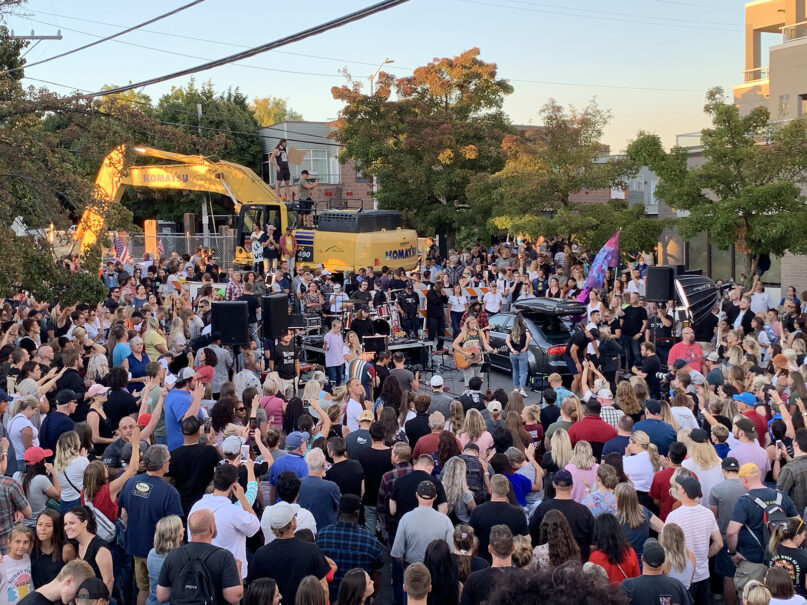
A large crowd gathers to hear California musician Sean Feucht perform with his band on a dead-end street near Seattle’s Gas Works Park, Monday, Sept. 7, 2020. RNS photo by Julia Duin
For Feucht and his ilk, praise and worship is the weapon for defeating those spiritual/political enemies just as it was for ancient Israel.
In praise and worship theology, this is sometimes called “The Jehoshaphat Principle” — that the worshippers go out ahead of the army to secure its spiritual victory through God’s presence in praise. The songs are anthemic, and the overall tone is joyful and unrelentingly positive — just as they are on Sunday mornings — in the belief that worship changes the emotional atmosphere as it changes the spiritual and political situation.
Though God’s spiritual power is believed to be released through musical worship in general, song choice is still powerful. A popular anthem being sung at Feucht’s (and other recent) gatherings is “Great Are You Lord,” by All Sons and Daughters. In the worship protest context, the line, “It’s your breath in our lungs, so we pour out your praise” becomes a defiant cry against mask requirements and governmental restrictions on congregational singing — while it also indexes a veiled reference to George Floyd’s infamous cry of “I can’t breathe.”
The sounds of deeper dialog
Feucht is just one node in a long line of Christians engaged in public political demonstrations. Though his tactics seem novel, they build on a theological and musical tradition going back many decades.
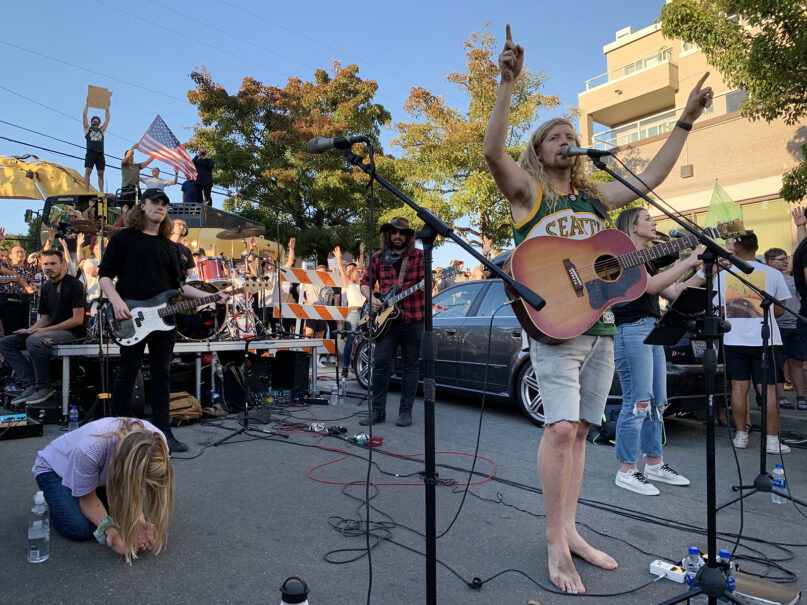
California musician Sean Feucht, right, performs with his band on a dead-end street near Seattle’s Gas Works Park after the city refused him access to the park for a Labor Day concert, Sept. 7, 2020. RNS photo by Julia Duin
It’s important to note, too, that his theology of praise and worship (if not his tactics) isn’t just a “white evangelical” thing but is also present in Black churches and “Latinx” churches. See, for example, the work of early praise and worship pioneers like Judith McAllister or Marcos Witt. So then, this theology of worship doesn’t have to end up entangled in white Christian Nationalist discourses the way it has for Feucht.
Looking into the backdrop of Feucht’s worship theology provides another lens for making sense of the present moment and, together with other analyses, can help us see through the fog of polarizing public discourse.
What’s at stake aren’t just political and ideological differences but complex and deeply rooted theological commitments that have long been forming Christian identities. It would be dangerous, however, to underestimate the theological nature of what is at stake for Feucht and his followers and how worship theologies are wielding power over the Christian imagination of justice and social action.
(Adam Perez is a doctor of theology candidate at Duke University Divinity School working on the history of praise and worship theology and music in the Americas. You can follow him on Twitter @adam_a_perez. The views expressed in this commentary do not necessarily represent those of Religion News Service.)
